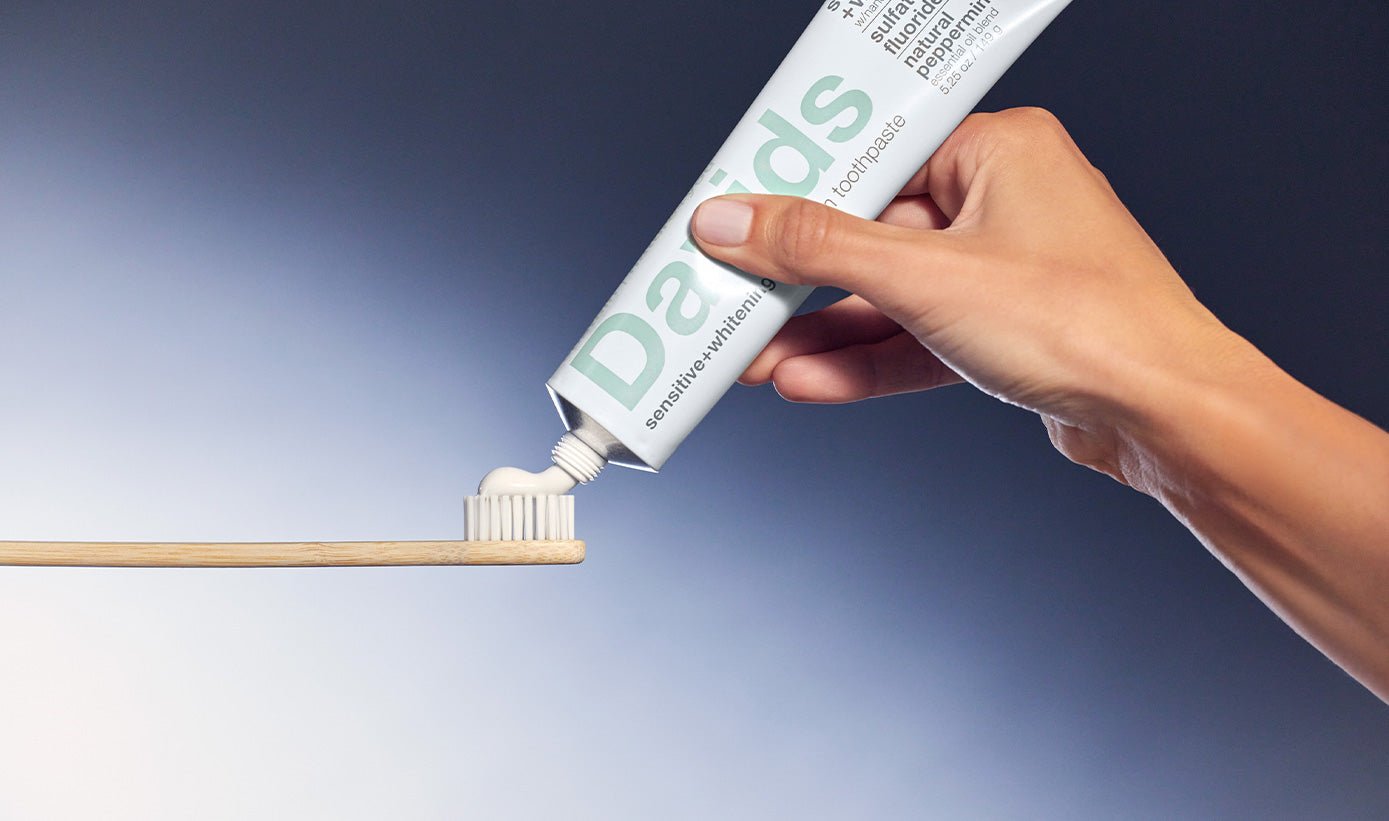Whether you’re pregnant, planning to become pregnant, or reading this article just for fun...congratulations on your interest in the intricacies of oral health during pregnancy!
If you are pregnant, you don’t need us to tell you that it can have some unexpected effects on your body. Your delicate oral microbiome is no exception, as it can experience some surprising and confusing changes when you’re pregnant. If you’re surprised that pregnancy can greatly impact your oral health, you’re not alone. A 2022 survey revealed that only about 53% of women received helpful information from their dentists about oral health during pregnancy.
That being said, we hope this article sheds some light on the topic and equips you with the info and products (hello, Davids hydroxyapatite toothpaste) to keep your mouth healthy and happy on this amazing journey.
pregnancy and oral health
During pregnancy, increased levels of estrogen and progesterone can present as a wide array of symptoms. As a common example, surging levels of estrogen during the first trimester can lead to infamous nausea.
But perhaps one of the lesser-known examples is pregnancy gingivitis (along with other oral health complications). Yup, soaring levels of estrogen and progesterone can cause inflammation in your gums. While experts haven’t come up with a direct answer for this, they believe it’s because pregnancy can increase the blood flow to your gums while simultaneously slowing your body’s natural ability to fight bad bacteria. On top of this, sugar cravings and increased vomiting can add on a few oral health complications.
If you find that your gums appear tender, red, and/or extra shiny during pregnancy, or they’re bleeding a lot more when you brush, you could be dealing with pregnancy gingivitis. Because pregnancy can cause gingivitis and reduce your ability to fight plaque, it can also lead to sensitivity and tooth decay. This is why it’s so important to go the extra mile to care for your oral health during pregnancy. In the next section, you’ll find some of our top tips to do just that!
ways to protect your oral health during pregnancy
Don’t worry, there are so many safe ways to care for your delicate oral microbiome while growing a human. (And in case no one has told you recently, you’re amazing for doing all the things while growing a human.) Now, let’s dive in.
- get your routine x-rays and any necessary fillings behind you before pregnancy. (This one only applies if you’re planning your pregnancy, of course). Although most dentists and ob/gyns agree it’s still safe to get dental x-rays while pregnant, why not get all of your dental work sorted beforehand if you can?
- continue to see your dentist during pregnancy. We hope you’re visiting your dentist for regular checkups every six months! We just want to remind you that pregnancy is one of the most important times to keep up with this good habit.
- eat a mouth-healthy diet. We recommend lowering your intake of sugary, starchy, and sticky foods and incorporating some of the foods outlined in this article written by Dr. Anu Isaac, DMD.
- brush twice daily with our sensitive + whitening hydroxyapatite toothpaste. This is one of the most important steps! Brushing twice daily (for two minutes each time) with our hydroxyapatite toothpaste is one of the best ways to avoid plaque buildup, tooth decay, sensitivity, and gingivitis. As our gentle micro-abrasives, baking soda, xylitol, and premium mint oils work together to fight plaque and stimulate saliva production, the hydroxyapatite particles remineralize any sensitive, weakened, or damaged spots in your enamel.
- floss once daily with our expanding dental floss. Our new safe dental floss is also infused with hydroxyapatite particles, so it can remineralize those hard-to-reach crevices in your mouth.
- consider adding a natural mouthwash to your routine. For an extra boost of remineralization and bacteria reduction, try adding an alcohol-free natural mouthwash to your routine! Psst, we’ll have a brand new one for you in 2024.
You’ll find that many other articles encourage you to brush twice daily with fluoride toothpaste, so let’s dive into why we prefer hydroxyapatite toothpaste for all your remineralizing and sensitivity-fighting needs (especially during pregnancy).
how Davids hydroxyapatite toothpaste can help
If you’ve made it this far, you know that keeping up with your oral care routine (with an added emphasis on enamel remineralization) is extra important when you’re pregnant. And when it comes to remineralization, we’re faced with the classic question: hydroxyapatite or fluoride?
It’s no secret that we prefer hydroxyapatite, and here are just a few reasons why.
- too much fluoride can be toxic. When you consider that fluoride hides in your water and toothpaste, it can be easy to over-consume it. Too much fluoride can lead to fluoride toxicity, which is why you’ll find a poison control warning on fluoride toothpaste. We understand wanting to avoid this exposure altogether, especially when you’re pregnant!
- on the other hand, hydroxyapatite is biocompatible. With hydroxyapatite, you don’t have to worry about overexposure to toxins. This is because it already exists in your body, so when you supplement with hydroxyapatite toothpaste, the particles feel “at home” in your body.
- research confirms that hydroxyapatite is an effective alternative to fluoride. Some might argue that fluoride is more effective simply because it has the ADA stamp of approval (and it’s dominated the market for so many years). However, research says hydroxyapatite is an effective substitute for fluoride, and you can read more about it in the studies linked below.
Did you know that our hydroxyapatite toothpaste is also lab-tested? Our specific formula outperformed leading sensitive toothpastes (Apagard Premio, Boka, Colgate Sensitive, Risewell, Sensodyne Pronamel, and Tom’s Sensitive) in remineralizing weakened areas of the enamel. You don’t have to take our word for it, the photo evidence (of real teeth magnified 3000x) speaks for itself!








